

Arguments For Stem Cell Research. The people who favour embryonic stem cell research are mostly scientists, and they have many arguments.
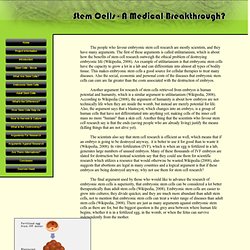
The first of these arguments is called utilitarianism, which is about how the benefits of stem cell research outweigh the ethical problem of destroying embryonic life (Wikipedia, 2008). An example of utilitarianism is that embryonic stem cells have the capacity to grow a lot in a lab and can differentiate into almost all types of bodily tissue. This makes embryonic stem cells a good source for cellular therapies to treat many diseases.
Also the social, economic and personal costs of the diseases that embryonic stem cells can cure are far greater than the costs associated with the destruction of embryos. Another argument for research of stem cells retrieved from embryos is human potential and humanity, which is a similar argument to utilitarianism (Wikipedia, 2008). Figure 16: Diagram of IVF Source: The arguments for and against embryonic stem cell research. Embryonic stem cells afford scientists tremendous power to dramatically change the treatment of disease, yet WA is the only Australian state to outlaw the science.
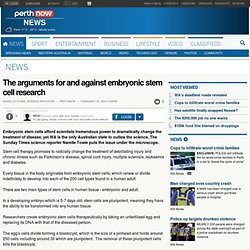
The Sunday Times science reporter Narelle Towie puts the issue under the microscope. Stem cell therapy promises to radically change the treatment of debilitating injury and chronic illness such as Parkinson's disease, spinal cord injury, multiple sclerosis, leukaemia and diabetes. Every tissue in the body originates from embryonic stem cells, which renew or divide indefinitely to develop into each of the 200 cell types found in a human adult.
There are two main types of stem cells in human tissue - embryonic and adult. In a developing embryo which is 5-7 days old, stem cells are pluripotent, meaning they have the ability to be transformed into any human tissue. Researchers create embryonic stem cells therapeutically by taking an unfertilised egg and replacing its DNA with that of the diseased person. ``That's a big issue for me. Embryonic stem cell research: an ethical dilemma. A human embryo can split into twins or triplets until about 14 days after fertilization Egg and sperm: some people believe an embryo must be fully protected from conception onwards (Wellcome Images/Spike Walker) Human blastocyst on the tip of a pin: embryonic stem cells can be grown from cells found in the blastocyst (Wellcome Images/Yorgos Nikas) Some people think an embryo deserves special protection from about 14 days after fertilization.
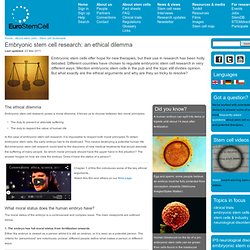
Potential uses of stem cells. Stem cells have potential uses in many different areas of research and medicine. Replace damaged tissue Human stem cells could be used in the generation of cells and tissues for cell-based therapies (that is, treating patients by transplanting specialised cells that have been grown from stem cells in the laboratory) .
Due to their ability to replace damaged cells in the body, stem cells could be used to treat a range of conditions including heart failure, spinal injuries, diabetes and Parkinson disease. What is a Stem Cell? What is an embryonic stem cell? Stem Cell FAQs - Bedford Stem Cell Research Foundation. Welcome to one of our most popular resources.

What are Stem Cells? By Dr Ananya Mandal, MD Stem cells are mother cells that have the potential to become any type of cell in the body.
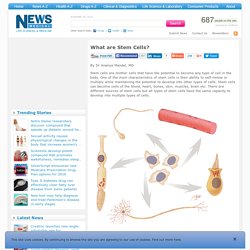
One of the main characteristics of stem cells is their ability to self-renew or multiply while maintaining the potential to develop into other types of cells. Stem cells can become cells of the blood, heart, bones, skin, muscles, brain etc. Stem Cell Basics: Introduction. The Nature of Stem Cells. Stem cells. Cookies on the New Scientist website close Our website uses cookies, which are small text files that are widely used in order to make websites work more effectively. To continue using our website and consent to the use of cookies, click away from this box or click 'Close' Find out about our cookies and how to change them Log in Your login is case sensitive I have forgotten my password My New Scientist. Stem Cell Quick Reference.
Somatic stem cells (also called adult stem cells) exist naturally in the body.
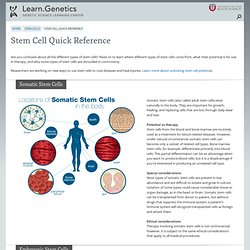
They are important for growth, healing, and replacing cells that are lost through daily wear and tear. Potential as therapy Stem cells from the blood and bone marrow are routinely used as a treatment for blood-related diseases.